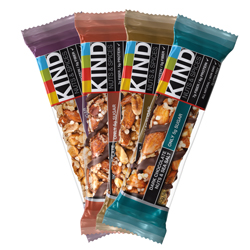Kind Healthy Snacks, which makes liberal use of the words "healthy" and "healthful" in selling 28 granola bars, including six with "Healthy" in their names, flunks FDA requirements for use of that term and has been ordered to make corrections.
 The Food & Drug Administration told Kind in a letter March 17 that the company did not meet the requirements for use of the term "healthy" on a food label, singling out four of the products.
The Food & Drug Administration told Kind in a letter March 17 that the company did not meet the requirements for use of the term "healthy" on a food label, singling out four of the products.
Joseph Cohen, SVP of communications for Kind and 2014 chair of PR Society of America, said the company is fully committed to working with the FDA and is "moving quickly to comply with its request."
He said nuts were to blame for the labeling problem. The nuts in the bars "contain nutritious fats that exceed the amount allowed under FDA’s standards," he said. "There is an overwhelming body of scientific evidence supporting that nuts are wholesome and nutritious."
Dr. Suzanne Steinbaum, preventive cardiologist at Lenox Hill Hospital, New York, said candy bars can also make the claim that they have nuts.
Four Bars Singled Out
Singled out as having too much saturated fat to be considered healthy, said Bloomberg, were Fruit & Nut Dark Chocolate Cherry Cashew, Fruit & Nut Almond & Apricot, Fruit & Nut Almond and Coconut, and Plus Peanut Butter Dark Chocolate + Protein.
Kind snack foods, according to Wikipedia, deliver between 180 and 210 calories and include a balance of fats and protein. The Kind Healthy Grains bars deliver 140-150 calories (equivalent of 9-10 teaspoons of sugar) and have at least 18 grams of whole grains per bar.
Strong & Kind bars deliver 230 calories each with 10 grams of protein. The 230 calories is the equivalent of 15.3 teaspoons of sugar.
A Milky Way candy bar (not made by Kind) has 170 calories. A 5th Avenue candy bar has 250. A 12-ounce can of Coca-Cola has 140 calories. A 12-ounce can of Pepsi-Cola has 150 (ten teaspoons of sugar).
Dentists Warn About Granola Bars
MSNBC reported May 21, 2014 that granola bars can be "bad for teeth."
"While candy bars and sugary drinks are well-known cavity culprits, many people have been surprised to learn that their nutritious, delicious snack bars—packed with all manner of healthy ingredient like dates, nuts, raisins and other fruit—can be just as bad for their teeth," said reporter Diana Mapes.
Dr. Richard Price of the American Dental Assn. said, "They are sticky and when something is sticky it stays in the mouth longer and the longer it stays the more time bacteria have to work on it. That creates an environment that is not healthy for teeth…bacteria that live in the mouth thrive on these foods, producing acids which over a period of time can destroy tooth enamel, resulting in decay."
Snack bars are often consumed "on the run" and when exercising and when there is no opportunity to rinse out the mouth or brush teeth, it was noted.
New York Times reporter Emily Rueb on Aug. 9 2013 investigated the pricing of Kind bars, calling them "a gooey slab of dried fruits and nuts, sometimes drizzled in chocolate," which she said ranged from 99 cents to $3.50 depending on where they were purchased. Prices were higher at travel locations such as airports and near check-out counters where purchase was a spur-of-the-moment decision.
The suggested price is $1.99. Rueb found that Kind bars on shelves at one Duane Reade store in New York were that price while other Kind bars at the checkout counter were $2.79. Whole Foods charges less for the bars "than almost any other retailer," reported Rueb. Whole Foods is one of the few supermarket chains that does not charge "slotting fees" to companies for advantageous positions on shelves.


 What the biggest meal of the day can teach us about serving up effective nutrition communications campaigns.
What the biggest meal of the day can teach us about serving up effective nutrition communications campaigns. Tips to refine and amplify your CPG brand strategy to win in 2024 and beyond.
Tips to refine and amplify your CPG brand strategy to win in 2024 and beyond. Strategic communications strategies for success in the growing “food is medicine” movement.
Strategic communications strategies for success in the growing “food is medicine” movement. How brands can authentically communicate sustainability issues and create a brand experience that’s compatible with consumers’ values.
How brands can authentically communicate sustainability issues and create a brand experience that’s compatible with consumers’ values. Communicating the effects that climate change and a growing world population have on our food system—and why change is needed.
Communicating the effects that climate change and a growing world population have on our food system—and why change is needed.


 Have a comment? Send it to
Have a comment? Send it to 
No comments have been submitted for this story yet.